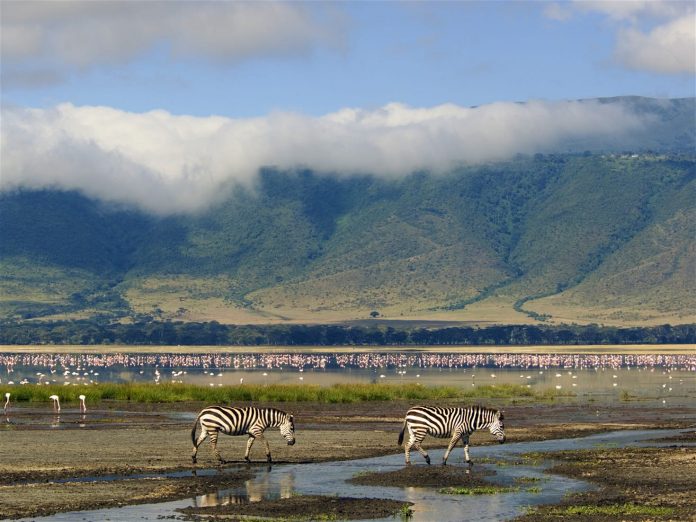Wondering where’s best to experience wildlife and nature in October? Why not explore China’s lost-in-time landscapes and Utah’s giant outdoor playgrounds, track polar bears through the tundra in Manitoba, Canada, or bear witness to the migration in Tanzania, one of the most incredible wildlife displays on the planet?
Prepare to retrieve your jaw from the floor on these four wild and wonderful trips.
Visit Moab for all-out action in wildest Utah
Couch potatoes, take note: Moab is not for you. The main reason to come to this little Utah town (especially in pleasantly mild October) is to leave it – by bike, boot, raft, 4WD or whatever else takes your fancy. First established by Mormon pioneers in the 1850s, Moab is now adventure HQ for a whole lot of world-class wilderness. The town itself is likeable and lively if aesthetically unlovely, but the area around it is lovely indeed.
The outdoor playgrounds of Arches and Canyonlands national parks are right on the doorstep: the former is an untouched immensity of crimson sandstone, artfully carved by Mother Nature; the latter a crumple of chasms, cracks, buttes and plateaus. Both are jaw-dropping. The Moab area is also home to countless mountain-bike trails, not least the Slickrock, a tough, twisty 9-mile (15km) loop across the Sand Flats’ Navajo sandstone. Prefer water? Rafting trips along the Colorado River run April to October.
- Trip plan: Spend four or five action-packed days, mixing up hikes, bikes and more.
- Need to know: Salt Lake City to Moab is a four-hour drive.
- Other months: Apr–May & Sep–Oct: mild; Jun–Aug: hot; Nov–Mar: cool/cold.
 A tundra tour gets up close to a family of polar bears in Manitoba
A tundra tour gets up close to a family of polar bears in Manitoba
Spot polar bears in Manitoba, Canada
With temperatures averaging -2°C (28°F), there needs to be a very good reason to brave the remote Manitoba outpost of Churchill in October. And there is – about 900 of them. Churchill is the self-proclaimed ‘Polar Bear Capital of the World’, with almost 1000 of the magnificent mammals living in the area.
In October and November, the bears move from their summer home on the tundra to their seal-hunting grounds on Hudson Bay, passing near Churchill in the process. Tours leave town in tundra buggies, fat-wheeled trucks that enable super-close safe encounters. It’s also possible to stay at remote, fly-in lodges to track the bears on foot – with an expert armed guide. Arctic fox, ptarmigan and caribou might also be spotted. October’s dark skies at this northerly latitude make aurora sightings a possibility too.
- Trip plan: October trips to Churchill must be booked well in advance. Allow a week, to include buggy tours and other activities.
- Need to know: Trains (45 hours) and planes (four hours) connect Winnipeg, Manitoba’s capital, and northern outpost Churchill.
- Other months: Apr–May: cold; Jun–Sep: warmest, belugas, birds; Oct–Nov: cold, polar bears; Dec–Mar: very cold, aurora, dog-sledding.
 A bamboo boat cruises down the Li River in Guilin against a backdrop of karst mountains
A bamboo boat cruises down the Li River in Guilin against a backdrop of karst mountains
Visit two picture-perfect provinces in southwest China in perfect climes
Guangxi and Yunnan are China at its most poetic. The rice terraces, karst hills, plunging gorges and snowy peaks of these diverse southwest provinces evoke an ancient land far removed from the nation’s forward-thrusting cities. October, with its mild, dry weather and golden colours is a particularly good time to get out into the countryside here, which ranges from the mountainous Tibetan Plateau to tropical lowlands where colourful minority cultures thrive.
Guilin is at the heart of Guangxi’s karst country, and is the place to arrange scenic cruises down the Li River to laid-back Yangshuo and visits to the Miao, Yao, Dong and Zhuang villages around Longsheng. In Yunnan, find heat, jungle hikes and a more southeast Asian vibe in the Xishuangbanna region, or head north for Lijiang’s cobbled alleys, treks along the sheer sides of Tiger Leaping Gorge and the utopian snowcapped highs around Zhongdian, officially renamed Shangri-La.
- Trip plan: Allow two to four weeks to visit both Yunnan and Guangxi, or focus on one. Handy trains and flights link Guilin, Kunming (Yunnan’s capital) and Lijiang.
- Need to know: There is a national holiday 1–7 Oct – transport/sites will be heaving. Avoid if possible.
- Other months: Apr–Sep: hot, humid (Jul–Sep: typhoons); Oct–Nov: warm, dry; Dec–Mar: cooler, cold at altitude.
 Spot a vast array of wildlife in the beautiful Ngorongoro Crater
Spot a vast array of wildlife in the beautiful Ngorongoro Crater
Incredible wildlife is at its greatest in northern Tanzania
Safaris don’t get more superabundant than this. The amount of wildlife that flows around Tanzania’s ‘northern circuit’ is bewildering: wildebeest and zebra herds numbering in the millions, hundreds of thousands of assorted antelopes, and healthy numbers of predators waiting to pick them all off… The end of the dry season, when the plains are unobstructed by vegetation, is when animals are easiest to see. Also, the skies are clear and immense.
By October, the herds of the Great Migration are usually grazing in the Serengeti’s far north. Ngorongoro Crater, a big, beautiful bowl of wildlife, is also ideal – animals are visible, and it’s a little less busy than July to September. Complement these with Lake Manyara (where, if you’re incredibly lucky, you might spot tree-climbing lions) and lesser-visited Tarangire National Park, where wildlife clusters at the riverine swamps.
- Trip plan: From Kilimanjaro Airport, make a northern circuit. Highlights include panoramic camps on the lip of Ngorongoro and seeking out parts of the Serengeti where walking safaris are permitted (in many areas, they’re not). Allow 10 to 14 days.
- Need to know: The Great Migration isn’t an exact science; herd movements vary year to year.
- Other months: Jan–Feb: dry; Mar–May: long rains; Jun–Oct: dry; Nov–Dec: lighter rains.
Looking for more inspiration? Check out our book Where To Go When for 360 ultimate escapes from family-friendly adventures to animal encounters and relaxing retreats.




